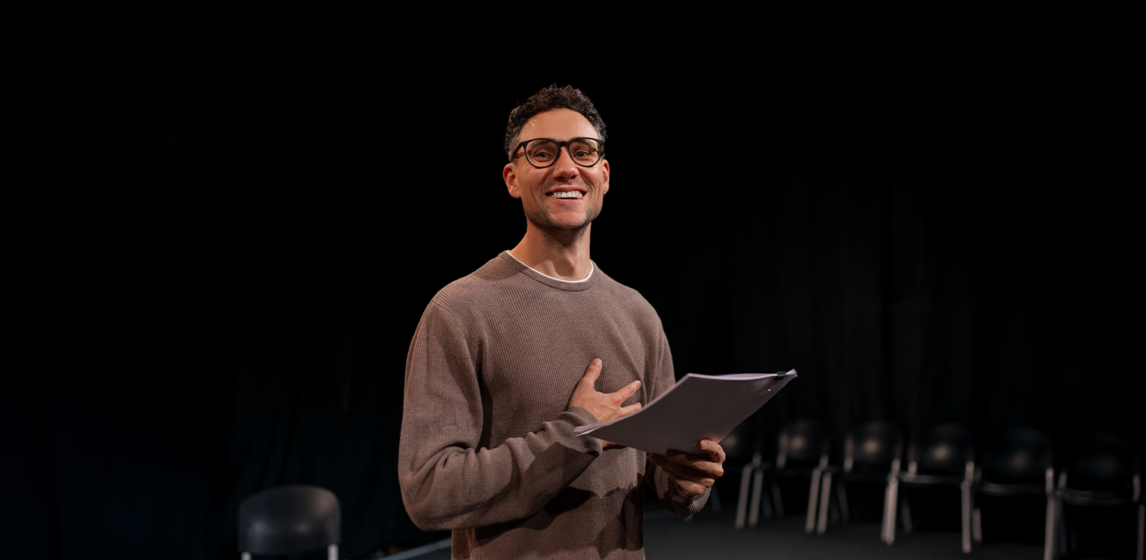Changing faith: Q&A with Michael Hidalgo
 Art Bamford | Jun 12, 2015
Art Bamford | Jun 12, 2015
Photo by Tyreke White
Michael Hidalgo has been described by Margaret Feinberg as “a voice you can’t afford to miss.” He serves as lead pastor of Denver Community Church, which has grown from forty people to over two thousand under his leadership, and was my church for several years. We recently caught up with Michael to ask him a few questions about his new book, Changing Faith: Questions, Doubts & Choices About an Unchanging God (InterVarsity Press).
FYI: What have you learned about doubt and faith that prompted you to write Changing Faith?
MH: Growing up in the church, I learned “doubt is bad.” What I’ve learned since then is that doubt gives us a chance to learn, experience, and grow more than we ever could. If we don’t ask the hard questions, how can we ever expect to find deeper truth?
This is exactly why I wrote Changing Faith. What I realized was many who had the courage and conviction to voice their questions, doubt, and skepticism were not faithless but faithful. They knew the answers they had were not enough, and they trusted God enough to ask. What I saw time and again was a deeper faith as a result of asking the questions. I want to invite others to do the same.
FYI: You share about some of the struggles that followed you through middle school. Can you tell us a bit about who or what helped you through this difficult season as a young Christian in middle and high school?
MH: Well, I can tell you honestly things did not really improve. As a matter of fact, I was not crazy about God when I was in middle and high school. Looking back, I was convinced that God was angry at me and was just waiting for his opportunity to strike me dead. I walked away quietly out of sheer terror.
In this midst of this, there were a few people – and I mean few! – who did not try to rescue me or fix me or save me. There were a few who loved me for who I was in all of my “messed-upness." Looking back, those were the people who saved me from a lot of bad choices. Not because they “preached” at me about my sin, but because when things got tough, I knew I could talk to them.
FYI: Have their been any role models or mentors who have encouraged you to feel more comfortable wrestling with doubts?
MH: When I finished college, I was filled with inner turmoil and questions. Then I met a pastor who surprised me because he did not seem bothered by my questions or unease about Christianity. He listened to me, and understood my journey to that point. In fact, he affirmed my questions.
It was so disarming, it opened me up to listen to him. And rather than try to persuade me or answer all my questions, he helped me ask better questions and gave me more things to think about. He taught me how to navigate the difficult terrain of the Christian faith, rather than pretend it was simple.
Since that time I have met many others like him. They all share the same quality: They do not try to answer my questions or explain away my doubts. Rather they guide me and lead me through them. Which speaks toward their humility, and ultimately their trust in the Spirit of God to speak.
FYI: As adults we often avoid talking with young people about doubt or difficult questions because of how challenging it can be for us—our intentions may be good but we’re scared of saying the wrong thing. What would you say to encourage another pastor who might be more timid about addressing some tougher questions?
MH: First, don’t tip-toe around. It looks like you’re hiding something! Students have amazingly accurate authenticity meters. Rush right into it. Affirm it. Remember that questions are how we learn. As little kids we point at things and say, “What’s that?” That’s the first stage of learning. And the way we learn never changes, the questions just get more complex. So, first, affirm the fact they have the courage to ask questions.
Second, ask them more questions, and better questions. What I mean is there is always something driving a question. If someone asks, “How can God be all-powerful when there is so much evil in the world?” That question is coming from somewhere. Mine that out. Learn why they are asking the question. Then guide them in their thinking.
Third, remember that people today have access to all kinds of information thanks to the Internet. What we need is not more information, but to learn how to think critically and how to assess the information we have access to. We have to keep this mindset front and center.
FYI: The title of our Can I Ask That? series refers to how young people often feel like certain questions aren’t “allowed” to be asked at church. I appreciated how Changing Faith both demystifies and addresses a lot of questions that are similarly taboo among many adult Christians. As a church leader, what questions do you wish others in leadership would ask more often? What would be a “Can I ask that?” question that you think is worth confronting for a pastor or ministry leader today?
MH: The most common question I receive as a pastor is, “What do you believe about …?” What I wish is that someone would ask, “If I were to follow you around for a month, what would I say your life is about?” I say this because we are fixated on what people believe about all sorts of controversial issues. But what about how I treat my wife? Or how much money I give away? Or how I serve the poor? Or how I parent my children? Or how I deal with lust?
We need to close the gap between orthodoxy and orthopraxy and remember – we show others what we believe by what we do. We see this in the gospels over and over when people ask Jesus questions. They say, “Rabbi, what must I DO to inherit eternal life?” Notice they don’t say, “What must I believe …?” They understood that practice reveals belief far more than what we articulate.
Amazon Affiliate links are included in this blog post. FYI earns from qualifying orders placed through links in this post.
More From Us



Sign up for our email today and choose from one of our popular free downloads sent straight to your inbox. Plus, you’ll be the first to know about our sales, offers, and new releases.



